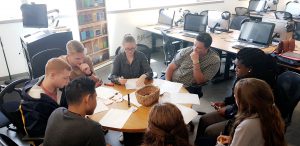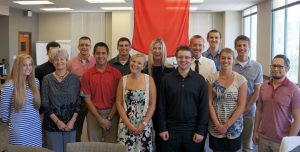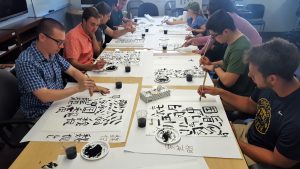Location: Online / SDSU
- Session 1: May 29 - June 14, 2024 (online)
- Session 2: June 17 - July 3, 2024 (SDSU)
- Session 3: July 8 - July 23, 2024 (SDSU)
- Session 4: July 24 - August 9, 2024 (SDSU)
Languages: Arabic, Chinese, Portuguese
Price: $300.00 per unit (subject to change)




Immerse yourself in one of these critical languages – Arabic, Chinese-Mandarin, or Portuguese. With SDSU's Summer Intensive Intensive Language Courses, you can earn 3-20 units of foreign language credit this summer. Each intensive language and culture studies class meets for four to six hours of interactive instruction daily, utilizing a combination of individual and group lessons and activities throughout the day using Canvas, Flipgrid, Google Apps, Kahoot, Youtube, social media, authentic text, audio, and video, and more.
Classes can be taken consecutively (e.g. 101 followed by 102) or individually (i.e. just 101 or just 102). Courses for session 1 and 2 will be held online (Zoom and Canvas). Session 3 and 4 will be delivered in-person at San Diego State University. If you would like to begin at 102 level or higher, please email your previous language experience (ie. course syllabus, homework sample, transcript) to larclanguageprograms@gmail.com
Click on the course below to view more information.
- Arabic 101 : May 29 – June 14, 8:00 am – 2:15 pm PST, 4 units of credit – 2024 price per unit: $300 (subject to change) – No Prerequisite
- Arabic 102: June 17 – July 3, 8:00 am – 2:15 pm PST, 4 units of credit – 2023 price per unit: $300 (subject to change) – Prerequisite Arabic 101
- Arabic 201: July 8 – July 23, 8:00 am – 2:15 pm PST, 4 units of credit – 2024 price per unit: $300 (subject to change) – Prerequisite Arabic 101/102
- Arabic 202: July 24 – August 9, 8:00 am – 2:15 pm PST, 4 units of credit – 2024 price per unit: $300 (subject to change) – Prerequisite Arabic 101/102/201
Program Description
Arabic 101 (Online)
This intensive four-unit course is an introduction to the sound and script system of the Modern Standard Arabic alphabet, high-frequency words, and simple sentences and very brief paragraphs for listening and reading comprehension. The course focuses on developing everyday Arabic conversational skills, use of vocabulary, linguistic structures, and essential grammatical forms, in addition to an introduction to Arab culture(s). Modern Standard Arabic (MSA) is used for classroom instruction in combination with authentic materials that expose students to a wide variety of topics, particularly those related to very basic daily activities.
Undergraduate and graduate students, working professionals, college and university faculty, and others may register. Individuals for whom Arabic is a first language (so-called “native” speakers) will not receive credit for taking lower division courses in Arabic, except with advance approval from the department. No credit will be given for lower division courses taken after successfully completing any upper division course in Arabic. No credit will be given for Arabic 101, 102, 201, 202, 301, 302 taken out of sequence.
There are no prerequisites for this course as it is at a beginner level.
Course Materials Arabic 101:
Kristen Brustad, Mahmoud Al-Batal, and Abbas Al-Tonsi: Alif Baa: Introduction to Arabic Letters and Sounds. 3ed. Washington, D.C.: Georgetown University Press, 2010.
Arabic 102 (SDSU)
This intensive four-unit course further develops novice-level Arabic language skills in speaking, listening, reading, and writing. Through engagement with authentic materials, students learn to create with the language and engage in basic daily conversations, consistently using sentence-level discourse. They build language skills around daily routines and activities, as well as topics related to travel and commerce.
Undergraduate and graduate students, working professionals, college and university faculty, and others may register. Individuals for whom Arabic is a first language (so-called “native” speakers) will not receive credit for taking lower division courses in Arabic, except with advance approval from the department. No credit will be given for lower division courses taken after successfully completing any upper division course in Arabic. No credit will be given for Arabic 101, 102, 201, 202, 301, 302 taken out of sequence.
Course Materials Arabic 102:
Merriam-Webster, Inc. Merriam-Webster’s Arabic-English Dictionary. Springfield, IL: Merriam-Webster Inc., 2010. View on Amazon
Course materials provided by the instructor.
Arabic 201 (SDSU)
This intensive four-unit course reinforces and expands upon material and grammar conventions acquired in beginning Arabic, advancing students to the intermediate level. They learn to communicate in complete sentences about basic everyday situations, as well as read about, listen to, and discuss information involving some topics beyond those related to immediate, daily survival needs.
Undergraduate and graduate students, working professionals, college and university faculty, and others may register. Individuals for whom Arabic is a first language (so-called “native” speakers) will not receive credit for taking lower division courses in Arabic, except with advance approval from the department. No credit will be given for lower division courses taken after successfully completing any upper division course in Arabic. No credit will be given for Arabic 101, 102, 201, 202, 301, 302 taken out of sequence.
Course Materials Arabic 201:
Abu-Chacra, Faruq. Arabic: An Essential Grammar. New York: Routledge, 2018.
Arabic 202 (SDSU)
This intensive four-unit course further develops intermediate level skills in Arabic speaking, listening, reading, and writing. Through the use of authentic materials, students continue to expand their abilities to communicate across a wide variety of topics, including more in-depth academic and cultural issues, and begin to handle work-related interactions that are limited in scope, as well as some unfamiliar situations.
Undergraduate and graduate students, working professionals, college and university faculty, and others may register. Individuals for whom Arabic is a first language (so-called “native” speakers) will not receive credit for taking lower division courses in Arabic, except with advance approval from the department. No credit will be given for lower division courses taken after successfully completing any upper division course in Arabic. No credit will be given for Arabic 101, 102, 201, 202, 301, 302 taken out of sequence.
Course Materials Arabic 202:
Buckwalter, Tim & Dilworth B. Parkinson. A Frequency Dictionary of Arabic: Core Vocabulary for Learners. New York: Routledge, 2011.
- Chinese 101: May 29 – June 14, 8:00 am – 3:15 pm PST, 5 units of credit – 2024 price per unit: $300 (subject to change) – No Prerequisite
- Chinese 102: June 17 – July 3, 8:00 am – 3:15 pm PST, 5 units of credit – 2024 price per unit: $300 (subject to change) – Prerequisite Chinese 101
- Chinese 201: July 8 – July 23, 8:00 am – 3:15 pm PST, 5 units of credit – 2024 price per unit: $300 (subject to change) – Prerequisite Chinese 101/102
- Chinese 202: July 24 – August 9, 8:00 am – 3:15 pm PST, 5 units of credit – 2024 price per unit: $300 (subject to change) – Prerequisite Chinese 101/102/201
Program Description
Chinese 101 (Online)
This intensive four-unit course is an introduction to the sound and script system of the Chinese language (simple present tense) as spoken in contemporary China. Through a variety of in-class activities, including games, logic exercises, and information gap routines, as well as written homework and exposure to Chinese multimedia resources, students learn Chinese conversational skills, develop vocabulary, linguistic structures, and essential grammatical forms to describe daily routines and situations, such as their occupation, age, family, etc. Students also gain initial exposure to the rich Chinese culture. The Chinese language is used in two styles—literary and colloquial—both of which are employed in the course from the beginning.
Undergraduate and graduate students, working professionals, college and university faculty, and others may apply. There are no prerequisites as this is a beginner course.
Course Materials Chinese 101:
- Liu, Yuehua, Tao-chung Yao, Nyan-Ping Bi, Liangyan Ge, and Yaohua Shi. Integrated Chinese (Simplified Chinese). 4th Ed. Vol. 1. Textbook. Boston: Cheng & Tsui, 2016.
- Liu, Yuehua, Tao-chung Yao, Nyan-Ping Bi, Liangyan Ge, and Yaohua Shi. Integrated Chinese (Simplified Chinese). 4th Ed. Vol. 1. Workbook. Boston: Cheng & Tsui, 2016.
Chinese 102 (SDSU)
This intensive four-unit course further develops novice-level Chinese language skills. Students learn to communicate on new topics, and read, write, listen, and speak in elementary Chinese in both simple present and simple past tenses. Through the use of authentic materials, students continue to develop and broaden their ability to communicate about daily routines and other every day topics in both the present and past tenses. The Chinese language is used in two styles—literary and colloquial—both of which continue to be employed in this course.
Undergraduate and graduate students, working professionals, college and university faculty, and others may apply.
Course Materials Chinese 102:
- Liu, Yuehua, Tao-chung Yao, Nyan-Ping Bi, Liangyan Ge, and Yaohua Shi. Integrated Chinese (Simplified Chinese). 4th Ed. Vol. 2. Textbook. Boston: Cheng & Tsui, 2016.
- Liu, Yuehua, Tao-chung Yao, Nyan-Ping Bi, Liangyan Ge, and Yaohua Shi. Integrated Chinese (Simplified Chinese). 4th Ed. Vol. 2. Workbook. Boston: Cheng & Tsui, 2016.
Chinese 201 (SDSU)
This intensive four-unit course reinforces and expands upon grammar conventions learned in beginning Chinese. Students improve their ability to comprehend and exchange information in complete sentences regarding most daily survival needs, personal history, and personal routines. Students practice reporting on various types of events, conducting interviews, and reading authentic material, such as announcements of public events, or simple prose containing biographical information or narrations of events. Through role-plays, dictation exercises, language games, and engagement with authentic materials, students broaden the situational experiences across which they can communicate, as well as their cultural knowledge.
Undergraduate and graduate students, working professionals, college and university faculty, and others may apply.
Course Materials Chinese 201:
- Liu, Yuehua, Tao-chung Yao, Nyan-Ping Bi, Liangyan Ge, and Yaohua Shi. Integrated Chinese (Simplified Chinese). 4th Ed. Vol. 3. Textbook. Boston: Cheng & Tsui, 2016.
- Liu, Yuehua, Tao-chung Yao, Nyan-Ping Bi, Liangyan Ge, and Yaohua Shi. Integrated Chinese (Simplified Chinese). 4th Ed. Vol. 3. Workbook. Boston: Cheng & Tsui, 2016.
- Amiot-Cadey, Gaelle and Susanne Reichert. Merriam-Webster’s Chinese English Dictionary. Springfield, IL: Merriam-Webster, Inc., 2010.
Chinese 202 (SDSU)
This intensive four-unit course continues to develop intermediate-level skills in speaking, listening, reading, and writing in the Chinese language as spoken in contemporary China. Students deepen and broaden the contextual situations across which they can communicate. Through responding to various prompts and engaging with authentic materials, they learn and master vocabulary, phrases, and social cues necessary to communicate on immediate survival needs, day-to-day routines and events, basic high-frequency transactions, and even occupational contexts, though to a limited extent.
Undergraduate and graduate students, working professionals, college and university faculty, and others may apply.
Course Materials Chinese 202:
- Liu, Yuehua, Tao-chung Yao, Nyan-Ping Bi, Liangyan Ge, and Yaohua Shi. Integrated Chinese (Simplified Chinese). 4th Ed. Vol. 3. Textbook. Boston: Cheng & Tsui, 2016.
- Liu, Yuehua, Tao-chung Yao, Nyan-Ping Bi, Liangyan Ge, and Yaohua Shi. Integrated Chinese (Simplified Chinese). 4th Ed. Vol. 3. Workbook. Boston: Cheng & Tsui, 2016.
- Amiot-Cadey, Gaelle and Susanne Reichert. Merriam-Webster’s Chinese English Dictionary. Springfield, IL: Merriam-Webster, Inc., 2010.
- Portuguese 101: May 29 – June 14, 8:00 am – 3:15 pm PST, 5 units of credit – 2024 price per unit: $300 (subject to change) – No Prerequisite
- Portuguese 102: June 17 – July 3, 8:00 am – 3:15 pm PST, 5 units of credit – 2023 price per unit: $300 (subject to change) – Prerequisite Portuguese 101
- Portuguese 203: July 8 – July 23, 8:00 am – 3:15 pm PST, 3 units of credit – 2024 price per unit: $300 (subject to change) – Prerequisite Portuguese 101/102
- Portuguese 204: July 24 – August 9, 8:00 am – 3:15 pm PST, 3 units of credit – 2024 price per unit: $300 (subject to change) – Prerequisite Portuguese 101/102/203
Program Description
Portuguese 101 (Online)
This intensive five-unit course develops novice-level skills in speaking, listening, reading, and writing. It focuses on Portuguese conversational skills, everyday use of vocabulary, linguistic structures, and essential grammatical forms, in addition to cultural knowledge. The course textbook and selected authentic materials expose students to a wide variety of topics, particularly those related to simple personal descriptions, common questions, greetings, and leave-takings, and very basic daily activities.
Undergraduate and graduate students, working professionals, college and university faculty, and others may apply. There are no prerequisites for this course as it is at a beginner level.
Course Materials Portuguese 101:
Jouet-Pastre, Clemence, Anna Klobucka, Patricia Isabel Sobral, Maria Luci de Biaji Moreira, and Amelia P. Hutchinson. Ponto de Encontro: Portuguese as a World Language. 2d Ed. Upper Saddle River, NJ: Pearson, 2013.
Larousse. Larousse Pocket Dictionary: Portuguese-English. Paris: Larousse, 2009.
Other Suggested Readings: Fernandes, G. (2010). Muito prazer - fale o portugues do Brasil.: Disal.
Portuguese 102 (SDSU)
This intensive five-unit course further develops novice-level Portuguese language skills in speaking, listening, reading, and writing. Through engagement with the course textbook and selected authentic materials, students learn to handle increasingly complex communication related to daily routines and activities, as well as topics related to travel and commerce, and asking and answering simple questions about themselves, their family and friends, and immediate survival needs.
Undergraduate and graduate students, working professionals, college and university faculty, and others may register.
Course Materials Portuguese 102:
Jouet-Pastre, Clemence, Anna Klobucka, Patricia Isabel Sobral, Maria Luci de Biaji Moreira, and Amelia P. Hutchinson. Ponto de Encontro: Portuguese as a World Language. 2d Ed. Upper Saddle River, NJ: Pearson, 2013.
Larousse. Larousse Pocket Dictionary: Portuguese-English. Paris: Larousse, 2009.
Other Suggested Readings: Fernandes, G. (2010). Muito prazer - fale o portugues do Brasil.: Disal.
Portuguese 203 (SDSU)
This intensive three-unit course reinforces and expands upon lexical content and grammar conventions learned in the beginning Portuguese course sequence. Students deepen and expand their ability to communicate in complete sentences about basic daily life situations, advancing them to the intermediate level, at which they also begin to read, listen, and discuss some topics of professional interest.
Undergraduate and graduate students, working professionals, college and university faculty, and others may apply.
Course Materials Portuguese 203:
Jouet-Pastre, Clemence, Anna Klobucka, Patricia Isabel Sobral, Maria Luci de Biaji Moreira, and Amelia P. Hutchinson. Ponto de Encontro: Portuguese as a World Language. 2d Ed. Upper Saddle River, NJ: Pearson, 2013.
Portuguese 204 (SDSU)
This intensive three-unit course further develops intermediate level skills in Portuguese across all modalities. Through engagement with course texts and with increasingly complex authentic materials, students deepen their skills to communicate across an expanding range of topics, including more in depth academic and cultural issues, as well as a limited range of occupational themes.
Undergraduate and graduate students, working professionals, college and university faculty, and others may apply.
Course Materials Portuguese 204:
Jouet-Pastre, Clemence, Anna Klobucka, Patricia Isabel Sobral, Maria Luci de Biaji Moreira, and Amelia P. Hutchinson. Ponto de Encontro: Portuguese as a World Language. 2d Ed. Upper Saddle River, NJ: Pearson, 2013.
Contact
Course content and prerequisites information: larclanguageprograms@gmail.com
Course registration and payment information: ces.sdsu.edu/about/contact-information
